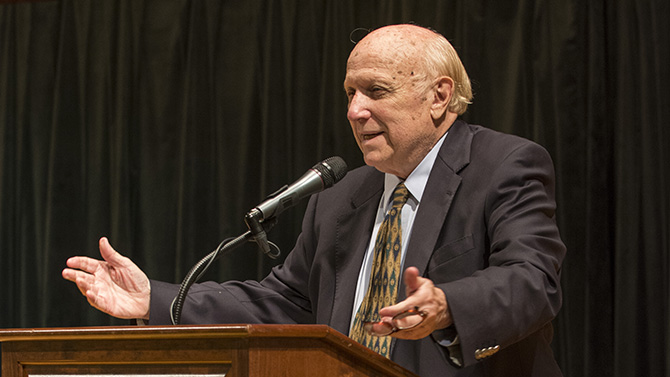


First Amendment, US exceptionalism
Photo by Doug Baker September 23, 2016
Soles Lecture focuses on ‘extraordinary’ free-speech protections
When Donald Trump makes certain statements about Muslims or Mexicans, for example, his critics may categorize his speech as offensive or divisive, but no one suggests it is criminal, according to attorney Floyd Abrams.
For that, Abrams told a University of Delaware audience, the United States can credit the First Amendment to the Constitution — a mere 45 words that today show “how extraordinarily different we are from other countries, even other democratic countries,” in protecting free speech.
Abrams, a renowned First Amendment lawyer, spoke at UD on Thursday, Sept. 22, delivering the sixth annual James R. Soles Lecture on the Constitution and Citizenship.
“We have a unique position in the democratic world,” Abrams said, contrasting U.S. free-speech protections with recent cases from other democracies.
He offered examples such as a Canadian man who distributed anti-gay fliers, was charged with a crime because of the offensive wording he used and had his conviction upheld by higher courts. A very different outcome occurred in the U.S. when members of the Westboro Baptist Church demonstrated against gay rights outside funerals of military service members, in a case that went to the Supreme Court, which upheld the church members’ right to protest.
No matter how offensive some speech may be, Abrams said, U.S. courts have been vigilant in recent decades in protecting First Amendment rights.
He offered other current examples, including British libel law, which strongly favors the person complaining of libel in contrast to U.S. law, and Europe’s “right to be forgotten,” in which people can require Google to delete true, public information about them under some circumstances.
In another case Abrams cited, a citizen in Belgium was convicted of a crime for distributing printed material advocating anti-immigrant and anti-Muslim policies. Again, the courts upheld that conviction.
“There are very serious policy arguments that can be made for other routes [regulating speech],” such as those in Western Europe, Abrams noted. His point, he said, is not that other countries are wrong but that the United States has taken a different route, resulting in its exceptional position among the world’s democracies.
Abrams also outlined some history of the Bill of Rights, which was not part of the Constitution when that document was adopted. When the Constitutional Convention adjourned in 1787, he said, the delegates agreed on one thing: “There would be no Bill of Rights.”
Most states and many of the founders believed there was no need to explicitly list actions the federal government could not take, such as restricting speech, the press or religion, Abrams said. He quoted Alexander Hamilton’s argument that, “The Constitution itself is a Bill of Rights.”
But, for reasons of politics and principle, opinions shifted and the 10 amendments that make up the Bill of Rights were eventually approved by Congress in 1789 and ratified by the states in 1791.
Today, Abrams said, “We would truly be a very different country without the Bill of Rights.”
A video of his presentation is available.
About Floyd Abrams and the Soles Lecture
Abrams, a senior partner in the New York-based law firm Cahill Gordon and Reindel, is known for his long career as a tireless free-speech advocate.
He told the audience at the 2016 Soles Lecture that he once worked as a law clerk for a federal judge in Delaware and had considered remaining in the state to practice. Today, he always tries to accept invitations to return, he said.
Abrams was once described by the late U.S. Sen. Daniel Patrick Moynihan as “the most significant First Amendment lawyer of our age.” He has litigated some of the most controversial free-speech and free-press cases of recent times, from the Pentagon Papers to Citizens United, arguing frequently before the Supreme Court.
His clients have included the McGraw-Hill Cos., Standard & Poor’s, The New York Times, ABC, NBC, CBS, CNN, Time Magazine, Business Week, The Nation and Reader’s Digest.
Abrams has taught at Columbia School of Journalism and at Yale and Columbia law schools.
The Soles Lecture honors the late James R. Soles, who was a faculty member in the Department of Political Science and International Relations for more than 34 years. The annual lecture also commemorates the signing of the U.S. Constitution in Philadelphia on Sept. 17, 1787, and is generally held on or near that anniversary date.
U.S. Vice President Joseph Biden, a UD alumnus, delivered the inaugural Soles Lecture in 2011. Other speakers have been U.S. Sens. Tom Carper and Chris Coons, Delaware Gov. Jack Markell and former Gov. and U.S. Rep. Michael N. Castle.
About the James R. Soles Citizenship Endowment
Prof. Soles, who died Oct. 29, 2010, received the University’s Excellence in Teaching Award twice and its Excellence in Advising Award, as well as the University’s Medal of Distinction. He received many honors and recognitions in his distinguished career, but he is still best remembered for his personal dedication to teaching and to his students.
The Soles endowment was established 15 years ago and supports a named professorship, undergraduate citizenship stipends and graduate fellowships.
The first stipends were awarded more than 10 years ago, and recipients have used that support in a wide range of accomplishments. To see more about recent recipients and the work they have done, visit this site.
Contact Us
Have a UDaily story idea?
Contact us at ocm@udel.edu
Members of the press
Contact us at 302-831-NEWS or visit the Media Relations website

